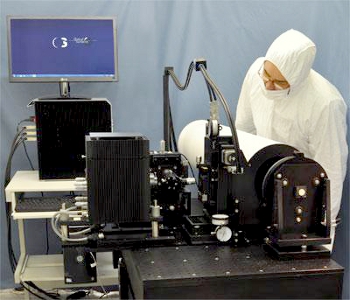Optical Surfaces Ltd. has supplied a motorised 155mm aperture UV-VIS-NIR collimator system and interferometric alignment system to the Optical Information Systems Group at the Deutsches Zentrum für Luft- und Raumfahrt (DLR) in Berlin, Germany.
DLR is Germany's national research centre for aeronautics and space. Its extensive research and development work in aeronautics, space, transportation and energy is integrated into national and international cooperative ventures. As Germany's Space Agency, the German federal government has given DLR responsibility for the forward planning and implementation of the German space programme as well as international representation of Germany's interests.

Ilse Sebastian, Project Manager at DLR commented, "The primary aims of installing this new system in our class 100,000 clean room will be to enable broad-band diffraction limited imaging for MTF measurement, focusing and geometric calibration of single optics and focal planes, fully integrated camera systems and imaging spectrometers at wavelengths between 230 nm and 2.6 µm.
"Exact positioning of targets at the collimator focus is achieved using x,y,z step motors that deliver movement steps of better than 1 arc second. Thermal sensors incorporated into the body of the collimator will allow us to make measurements immune to operating temperature changes. To monitor and verify that the system is consistently in alignment - Optical Surfaces also designed and supplied a software-operated Laser Unequal Pathlength Interferometer (LUPI) system to interface with the collimator system".
She added, "We selected Optical Surfaces Ltd for this important and challenging custom specified project because of its considerable expertise and experience in producing complete collimator assemblies based around high precision optics and its decades of experience which ensure that in mounting the optics, performance is not compromised".
Dr Aris Kouris of Optical Surfaces Ltd commented "The DLR project presented us with a series of challenges that required the considerable optomechanical expertise of our design, development and production team to solve.
"The result of our collaboration with DLR has been to produce a motorised broadband (UV to IR) collimator system which is able to make geometrical calibration, focusing and MTF measurements on optics, camera systems and spectrometers with multiple degrees of freedom and unmatched accuracy".